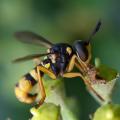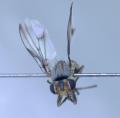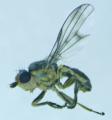Diptera.info :: Identification queries :: Diptera (adults)
Who is here? 1 guest(s)
|
Pollenia cf. vagabunda
|
|
| Tony T |
Posted on 07-04-2008 16:18
|
|
Member Location: New Brunswick, Canada Posts: 662 Joined: 08.02.07 |
anyone else brave enough to tackle Pollenia ID's. Whitworth describes P. vagabunda "a dark median stripe between the presutural acrostichal setae is a distinctive character" "usually 2 or more extra setae in front of the regular row of 3 (2-4)humeral setae; 2 inner posthumeral setae" This fly seems to fit this description, yes? no? Purposefully overexposed to more clearly show the setae. 29 March 2008, New Brunswick, Canada Tony T attached the following image:  [160.48Kb] Edited by Tony T on 27-04-2008 14:01 |
|
|
|
| Susan R Walter |
Posted on 07-04-2008 19:24
|
|
Member Location: Touraine du Sud, central France Posts: 1802 Joined: 14.01.06 |
Tony I can't help except to say that I think you make a good case here. I don't have enough experience with Pollenia to do any more than work through the key like you have. Rognes says that female Pollenia require long years of experience to ID from external characters.
Susan |
| Tony T |
Posted on 07-04-2008 22:26
|
|
Member Location: New Brunswick, Canada Posts: 662 Joined: 08.02.07 |
Thanks Susan. I don't find Pollenia interesting but that's about all that's flying now. Desperate to take photos as it's been/still is a loong winter. Hopefully when we get rid of the 3' of snow/ice that's still on the ground some more interesting flies will emerge. Nice to know about the difficulty with females, something Whitworth failed to mention. Edited by Tony T on 07-04-2008 22:27 |
|
|
|
| conopid |
Posted on 07-04-2008 23:46
|
|
Member Location: United Kingdom Posts: 1039 Joined: 02.07.04 |
Tony and Sue, I think this shows how photos can help with the work of identifying difficult genera. Comparing two or three photos of similar species looks much easier than staring down a microscope at one specimen, then the next and trying to decide if it's different. Looking at a photo where stacking has been used, also makes viewing features like the arrangement of several setae much easier to appreciate. Really useful stuff. I'd hate to try and do those Pollenia without years of experience. But photos like this should make it somewhat easier. 
Nigel Jones, Shrewsbury, United Kingdom |
|
|
|
| Kahis |
Posted on 08-04-2008 08:58
|
|
Member Location: Helsinki, Finland Posts: 1999 Joined: 02.09.04 |
It does indeed look like the P. vagabunda we have here in N. Europe.
Kahis |
| Susan R Walter |
Posted on 08-04-2008 14:00
|
|
Member Location: Touraine du Sud, central France Posts: 1802 Joined: 14.01.06 |
Nigel I agree with you - very often looking at Tony's pics is better than looking at the real thing  - much easier to focus on too. - much easier to focus on too.Can we have this one in the gallery, with its annotation? Edited by Susan R Walter on 08-04-2008 14:00 Susan |
| Tony T |
Posted on 08-04-2008 22:08
|
|
Member Location: New Brunswick, Canada Posts: 662 Joined: 08.02.07 |
What appears to be the basic pattern of setae on Pollenia thoraces is HERE |
|
|
|
| Jump to Forum: |















